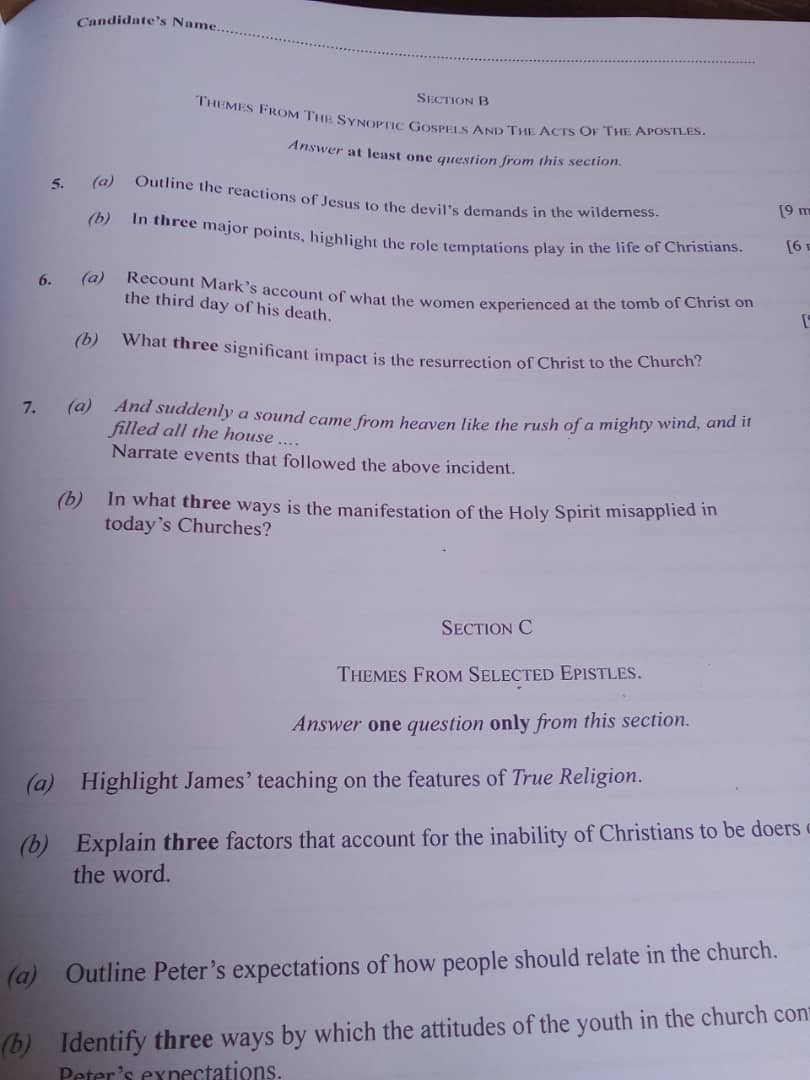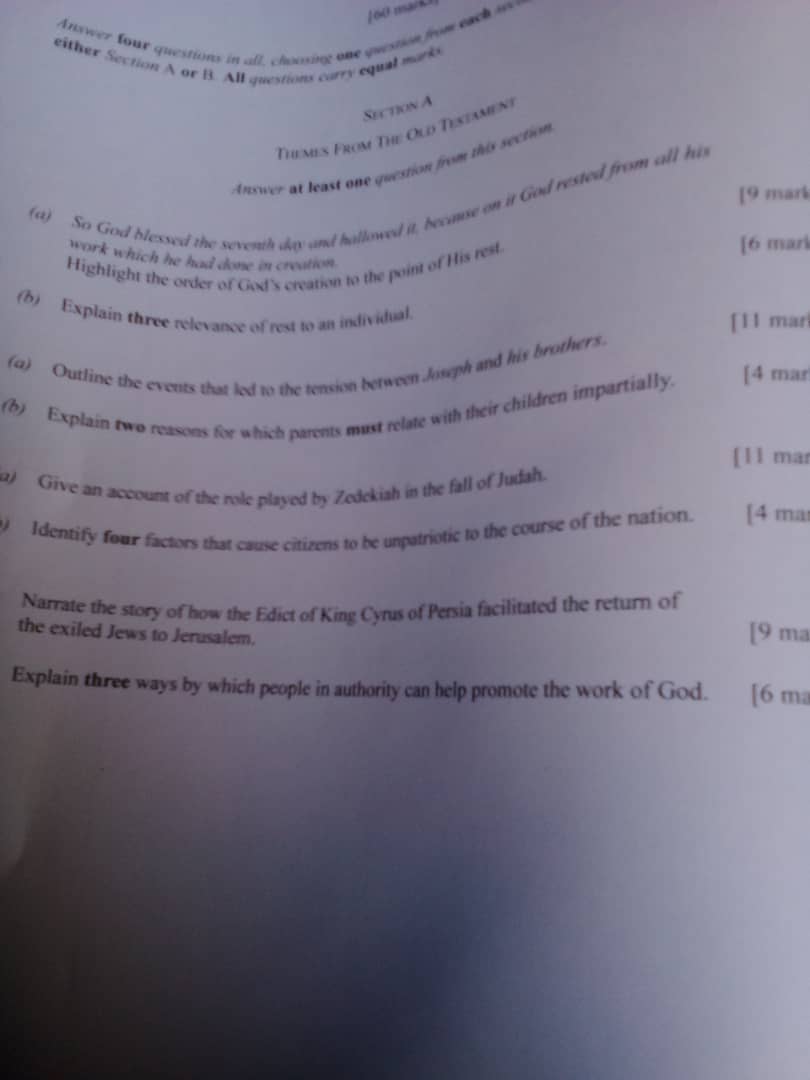2024 WAEC GCE CRS/IRS Essay & OBJ Questions and Answer, WAEC GCE 2024 CRS/IRS Questions and Answers, Get free Christian Religious Studies (CRS) and Islamic Religious Studies (IRS) Objective/Essay questions and answers for the 2024 WAEC GCE November/December exams. Access the second series of WAEC GCE Nov/Dec CRS/IRS questions and answers Objective/Essay right here.

This is to inform all candidates taking the 2024 West African Examinations Council (WAEC) General Certificate of Education (GCE) November/December exam that the Christian Religious Studies (CRS) and Islamic Studies (IRS) Objective/Essay questions and answers are now available here.
Table of Contents
ToggleWAEC GCE CRS/IRS Exam Details:
- Exam: Christian Religious Studies 2 (Objective and Essay/Theory) & Islamic Studies 2 (Objective and Essay/Theory)
- Date: Friday, 29th November 2024
- Time:
- Christian Religious Studies 2 (Essay): 9:30 am – 11:30 am.
- Christian Religious Studies 1 (Objective): 11:30 am – 12:30 pm.
- Islamic Studies 2 (Essay): 9:30 am – 11:30 am.
- Islamic Studies 1 (Objective): 11:30 am – 12:20 pm.
To Get Early WAEC GCE CRS/IRS Questions and answers click on the link below 👇
CLICK HERE TO GET FULL QUESTIONS AND ANSWERS
2024 WAEC GCE CRS/IRS Essay & OBJ Questions and Answers
We are offering free Christian Religious Studies (CRS) and Islamic Religious Studies (IRS) Objective/Essay questions and answers for private candidates.


WAEC GCE CRS THEORY (ESSAY) ANSWERS 2024:
=======================
CRS
(3a)
Zedekiah, the last king of Judah, played a significant role in the nation’s downfall due to his disobedience and weak leadership. He ascended the throne as a vassal of Babylon after King Nebuchadnezzar had removed his predecessor. Despite swearing loyalty to Nebuchadnezzar, Zedekiah rebelled by seeking an alliance with Egypt, an act that provoked Babylon’s wrath (2 Kings 24:17-20).
Zedekiah ignored repeated warnings from the prophet Jeremiah, who urged him to submit to Babylon as God’s will for Judah’s survival. Instead, he allowed his officials to persecute Jeremiah and continued to listen to false prophets who assured him of victory (Jeremiah 27:12-15). His failure to heed God’s word led to the siege of Jerusalem in 586 BC.
During the Babylonian assault, Zedekiah attempted to flee but was captured near Jericho. He witnessed the execution of his sons before being blinded and taken to Babylon in chains (2 Kings 25:1-7). His actions—marked by rebellion, reliance on human alliances, and refusal to trust God—sealed Judah’s fate, leading to the destruction of Jerusalem and the Temple, as well as the exile of its people.
(3b)
(i) Corruption and Poor Governance: Citizens lose trust in leadership when leaders prioritize personal gain over public welfare.
(ii) Economic Hardship: Widespread poverty, unemployment, and inequality can breed resentment and disconnection from national ideals.
(iii) Lack of Justice and Fairness: When citizens perceive laws and policies as biased or unjust, they feel alienated from the nation.
( iv) Oppression and Lack of Freedom: Suppression of rights, such as free speech or participation in governance, discourages loyalty and pride in the nation.
*WAEC GCE CRS*
*NUMBER FIVE*
(5a)
(i) Jesus was led by the Spirit into the wilderness to be tempted by the devil
(ii) After fasting for 40 days and nights, the devil approached Jesus and tempted him in three ways, Turning stones into bread to satisfy his hunger, Throwing himself down from the pinnacle of the temple to prove God’s protection, Offering all the kingdoms of the world in exchange for Jesus worshiping him
(iii) Jesus responded to each temptation by quoting Scripture, firmly rejecting the devil’s proposals.
(iv) In the final temptation, Jesus declared, “Away with you, Satan! For it is written, ‘You shall worship the Lord your God, and Him only you shall serve'”
(v) The devil then left Jesus, and angels came and ministered to him
(5b)
(PICK ANY THREE)
(i) Temptations test and strengthen our faith: Facing temptations provides an opportunity to demonstrate our commitment to God and grow in our relationship with Him.
(ii) Temptations reveal our weaknesses and vulnerabilities: Encountering temptations can expose areas in our lives where we need to seek God’s guidance and support.
(iii) Temptations provide a chance for spiritual growth: Overcoming temptations can lead to increased wisdom, discernment, and a deeper understanding of God’s will for our lives.
(iv) Temptations can be used by God for His purposes: God may allow us to face temptations to refine our character, deepen our dependence on Him, or prepare us for future challenges.
(v) Temptations remind us of our need for God’s grace and strength: Facing temptations can lead us to rely more on God’s power and the guidance of the Holy Spirit to resist sin.
(vi) Temptations offer an opportunity to set an example for others: By successfully navigating through temptations, we can inspire and encourage fellow believers to stand firm in their faith.
CRS
(8a)
James highlights the characteristics of true religion in practical terms, emphasizing faith in action. According to him, true religion is not about mere rituals or appearances but about living out God’s Word in love and obedience.
Firstly, James teaches that true religion involves controlling one’s tongue. He warns against careless speech, stating that anyone who does not bridle their tongue deceives themselves, and their religion is worthless (James 1:26).
Secondly, it involves compassionate care for the needy. James emphasizes caring for orphans and widows, the most vulnerable in society, as an essential mark of true faith (James 1:27). This reflects God’s heart for justice and mercy.
Finally, true religion requires personal holiness and moral integrity. James calls believers to keep themselves “unstained by the world,” living in obedience to God’s principles rather than conforming to worldly values (James 1:27).
True religion, according to James, is active, compassionate, and reflective of God’s character. It is faith lived out in deeds, as he later states: “Faith without works is dead” (James 2:17).
(8b)
(PICK THREE)
(i) Lack of Understanding: Many Christians hear the Word but fail to grasp its meaning, leading to shallow faith and inaction.
(ii) Distractions of Worldly Pursuits: Preoccupation with materialism and personal ambitions diverts focus from applying God’s Word in daily life.
(iii) Fear of Persecution or Criticism: Some Christians hesitate to live out their faith openly, fearing societal rejection or mockery.
(iv) Spiritual Laziness: A lack of discipline in prayer, study, and service leads to passive rather than active faith.
(v) Unresolved Sin: Persistent sin hardens the heart, making it difficult to align actions with the teachings of Scripture.
=======================
Answers loading…
WAEC GCE IRS THEORY (ESSAY) ANSWERS 2024:
=======================
*WAEC GCE ISLAMIC STUDIES*
(1)
Prophet Muhammad (S.A.W.) met Khadijah through his uncle, Abu Talib, who had arranged for Muhammad to work for Khadijah as a merchant. Khadijah was impressed by Muhammad’s honesty and integrity, and she proposed marriage to him. Muhammad accepted, and they were married when Muhammad was 25 years old and Khadijah was 40 years old.
(2)
The Second Pledge of Aqabah took place in 621 CE, when a group of 73 men and 2 women from Medina pledged their allegiance to Prophet Muhammad (S.A.W.). This pledge marked the beginning of the Islamic community in Medina and paved the way for the Prophet’s migration from Mecca to Medina.
(4a)
إِنَّا أَنزَلْنَاهُ فِي لَيْلَةِ الْقَدْرِ
وَمَا أَدْرَاكَ مَا لَيْلَةُ الْقَدْرِ
لَيْلَةُ الْقَدْرِ خَيْرٌ مِّنْ أَلْفِ شَهْرٍ
(4b)
“We have indeed revealed this (Quran) in the Night of Power.
And what will explain to you what the Night of Power is?
The Night of Power is better than a thousand months.”
(4c)
(i)The importance of the Night of Power (Laylatul Qadr), which is considered better than a thousand months.
(ii)The revelation of the Quran during the Night of Power.
(iii)The significance of the Night of Power as a time for spiritual reflection and devotion.
(iv)The importance of seeking forgiveness and guidance during the Night of Power.
(v)The value of patience and perseverance, as the Night of Power is considered a time of great spiritual reward.
(5a)
(i)Fajr (dawn prayer)
(ii)Dhuhr (noon prayer)
(iii)Asr (afternoon prayer)
(iv)Maghrib (sunset prayer)
(v)Isha (night prayer)
(5b)
(i)Making the intention to perform the prayer.
(ii)Performing the ablution (wudu).
(iii)Standing facing the direction of the Kaaba (qiblah).
(iv)Reciting the opening chapter of the Quran (Al-Fatihah).
(v)Performing the ruku (bowing) and sujud (prostration).
(vi)Reciting the final greetings (Tasleem).
(6a)
مَنْ صَامَ رَمَضَانَ إِيمَانًا وَاحْتِسَابًا غُفِرَ لَهُ مَا تَقَدَّمَ مِنْ ذَنْبِهِ
(6b)
“Whoever fasts Ramadan with faith and seeking reward, his previous sins will be forgiven.”
(6c)
(i)The importance of fasting in Ramadan with faith and sincerity.
(ii)The reward of forgiveness for previous sins for those who fast with faith and seeking reward.
(iii)The value of seeking reward and forgiveness from Allah.
(iv)The significance of Ramadan as a month of forgiveness and mercy.
(v)The importance of having faith and sincerity in one’s actions to attain reward and forgiveness.
=======================
Answers loading…
WAEC GCE CRS OBJECTIVE (OBJ) ANSWERS 2024:
=======================
=======================
Answers loading…
WAEC GCE IRS OBJECTIVE (OBJ) ANSWERS 2024:
=======================
=======================
Answers loading…
WAEC GCE CRS/IRS Essay and Objectives Questions and Answers 2024, 2024 WAEC GCE CRS/IRS Expo, WAEC GCE CRS/IRS Essay and Objectives Runs 2024, CRS/IRS Essay and Objectives WAEC GCE Answers 2024, WAEC GCE Nov/Dec CRS/IRS Essay and Objectives Runz, 2024 Nov/Dec WAEC GCE CRS/IRS Essay and Objectives Questions and Answers, WAEC GCE CRS/IRS Questions and Answers 2024, 2024 WAEC GCE CRS/IRS Obj/Essay Expo, WAEC GCE CRS/IRS essay/Obj answers Runs 2024, CRS/IRS Obj & essay WAEC GCE Answers 2024, WAEC GCE Nov/Dec CRS/IRS Runz, 2024 WAEC GCE CRS/IRS Objective/Theory Questions and Answers Leak.
2024 WAEC GCE CRS/IRS Questions and Answers – Study Materials
Objective Questions (CRS/IRS 1):
WAEC GCE CRS Past Questions (Objective):
- Who led the Israelites out of Egypt according to the Bible?
- A. David
- B. Moses
- C. Elijah
- D. Joshua
- Answer: B. Moses
- In the parable of the Good Samaritan, who was the first person to pass by the wounded man?
- A. A Levite
- B. A Priest
- C. A Samaritan
- D. A Roman Soldier
- Answer: B. A Priest
- Who was the first king of Israel?
- A. Solomon
- B. David
- C. Saul
- D. Samuel
- Answer: C. Saul
Past: WAEC GCE CRS Essay Questions:
- Discuss the significance of the covenant God made with Abraham.
- Answer: The covenant between God and Abraham is foundational to the Judeo-Christian faith. It signifies God’s promise to make Abraham the father of a great nation and to give his descendants the land of Canaan. This covenant also symbolizes God’s intention to establish a special relationship with Abraham and his lineage. It is marked by the promise of numerous descendants, the rite of circumcision, and the commitment of Abraham’s descendants to follow God’s commands.
- Explain the lessons learned from the story of Joseph and his brothers.
- Answer: The story of Joseph and his brothers teaches the importance of forgiveness and God’s providence. Despite being sold into slavery by his brothers, Joseph rose to a position of power in Egypt. When his brothers came to Egypt for food, Joseph forgave them and provided for them. The story emphasizes that God can turn negative circumstances into positive outcomes and that forgiveness restores relationships.
WAEC GCE IRS Past Questions (Objective):
- Who was the first person to accept Islam after Prophet Muhammad (SAW)?
- A. Abu Bakr
- B. Khadijah
- C. Ali
- D. Uthman
- Answer: B. Khadijah
- The migration of Prophet Muhammad (SAW) from Makkah to Madinah is known as:
- A. Isra
- B. Jihad
- C. Hijrah
- D. Hajj
- Answer: C. Hijrah
- Which of the following is NOT one of the pillars of Islam?
- A. Salat
- B. Zakat
- C. Jihad
- D. Sawm
- Answer: C. Jihad
Sample WAEC GCE IRS Essay Questions:
- Discuss the importance of the Qur’an in the life of a Muslim.
- Answer: The Qur’an is the holy book of Islam, revealed to Prophet Muhammad (SAW). It serves as a guide for Muslims in all aspects of life, providing moral and legal guidelines. It is considered the ultimate source of knowledge, addressing spiritual, ethical, and social matters. Muslims recite it in prayers, seek guidance from it in daily affairs, and follow its teachings as a way of life. The Qur’an also fosters a strong sense of unity and identity among Muslims worldwide.
- Explain the significance of the Hajj in the life of a Muslim.
- Answer: Hajj is the fifth pillar of Islam and is an obligation for every Muslim who is physically and financially capable. It is a pilgrimage to the holy city of Makkah that must be performed at least once in a lifetime. Hajj serves as a spiritual journey that emphasizes the equality of all Muslims before God, as they wear simple white garments. It is a time for self-reflection, repentance, and seeking forgiveness. Completing Hajj is believed to cleanse a Muslim of sins and renew their faith.
These sample questions can help you practice and get a feel for the format of the exam. For the best preparation, focus on your textbooks, past question papers, and other recommended study materials.
Recommended post:
DISCLAIMER: This service is provided for educational purposes only. We do not promote or encourage exam malpractice.
Stay focused, and ace your WAEC GCE CRS/IRS Questions and Answers 2024 exam!

